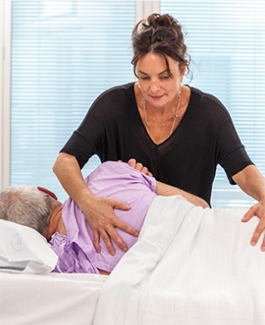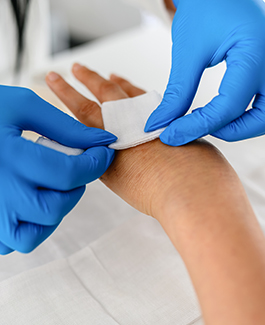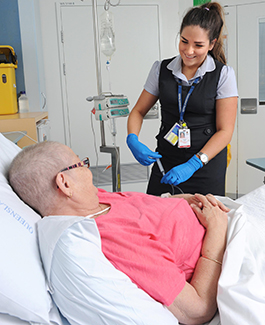Improving the delivery of acute wound care services in hospitals
Wounds cause pain, discomfort and can compromise quality of life. They also place patients at risk of various complications such as deadly infections.
Our research improves the care provided to hospitalised patients with wounds, resulting in better patient experiences and outcomes, and savings to the health system. Almost all patients in hospital have a wound, whether it be a surgical wound, a wound from an intravascular device (drip) or a pressure injury.
To achieve our vision, we investigate how to prevent and treat these wounds and ensure this knowledge translates into both policy and practice.
Research highlights
Wiser wound care focus of new Centre of Research Excellence
Griffith University has been awarded a $2.5 million National Health and Medical Research Grant to develop a Centre of Research Excellence (CRE) to improve delivery of acute wound care services in hospital.
Our Mission
We undertake systematic reviews and implementation/de-implementation research to improve patient outcomes. We focus on engaging with end-users, both consumers and clinicians in our research and knowledge translation activities, as well as providing research training.
Focus areas
We focus on three high-volume, high-risk and high-cost acute wounds that occur in hospital.

Pressure injuries
Pressure injuries are potentially preventable injuries to the skin and underlying tissues. In hospitalised patients, pressure injury prevalence is 12.8%. Our research focuses on developing evidence-based interventions that increase hospitalised patients' involvement in prevention of pressure injuries, contributing to reducing the clinical and cost impacts on patients, their families and the healthcare system.
Experts: Professor Wendy Chaboyer, Professor Liz McInnes and Professor Brigid Gillespie

Surgical wounds
Postoperative wound infection is one of the most avoidable hospital-acquired complications. Between 11-19% of patients develop a postoperative wound infection up to 30 days following surgery. Our research is focused on developing interventions to inform improvements in the safety, quality and experiences of surgical patients and their families by generating high quality research evidence that promotes the best clinical practice.
Experts: Professor Brigid Gillespie and Professor Wendy Chaboyer

Intravascular devices
Intravascular device wounds/skin complications are extremely prevalent but preventable. Globally, 25% of central and 36% of peripheral IVDs are removed due to complications ( e.g. bruising, swelling, dermatitis). Our research focuses on developing evidence-based interventions that minimise complications and optimise patient care.
Experts: Professor Claire Rickard and Professor Amanda Ullman
Logos

NHMRC Centre of Research Excellence
The National Health Medical Research Council (NHMRC) awarded our team a 5-year Centre of Research Excellence (CRE - App1196436) in Wiser Wound Care. Our CRE was established on 1 January 2021.
Partner with us
Partnerships and collaboration are essential to our research impact. We partner widely with industry, not-for-profit organisations and government. We also collaborate with fellow researchers and maintain strong ties with our community.
If you would like to partner with us, or tap into our research expertise, facilities or services, please get in touch.
Examples of research projects
Pressure injuries
- Prophylactic dressings to prevent pressure injuries
- Pressure injuries in the nursing home residents
- End-of life wounds
- Pressure injury prevention in intensive care unit patients
Surgical wounds
- Implementation of ERAS surgical care pathways
- Patient-reported experience measures in surgical care
- Patient participation in surgical wound care
- Patient education interventions in the postoperative period
Intravascular devices
- Exploring peripheral intravenous catheter insertion factors, dressing characteristics and outcomes
- Preventing InfusAte injuries Throughout a Child's Hospitalisation (PATCH)
- Protect Peripheral intravenous catheters (The ProP trial)
Examples of research summaries
Pressure injury prevention care bundles
Discharge education for general surgery patients
New clinical tools developed
- Pressure Injury Prevention Toolkit (DVD, poster and brochure available in 8 languages) (Professor Wendy Chaboyer)
- Perioperative Perceived Competence Scale-Revised (in 8 languages) (Professor Brigid Gillespie)
- Perioperative Perceived Competence Scale-Short Form (Professor Brigid Gillespie)
- End-of-life Wound Assessment Tool (Dr Sharon Latimer) (to access the tool, please contact Dr Latimer via email to: s.latimer@griffith.edu.au)
- Translation and Testing of an ICU PI Risk Assessment tool (in English, Spanish, Chinese & Turkish) (Dr Josie Lovegrove)
- Surgical Wounds and Patient Participation Questionnaire (SWAPP-Q) (in English, Dutch & Swedish) (Dr Georgia Tobiano)
- I-DECIDED Intravascular Device Assessment and Decision Tool (in numerous languages) (Professor Claire Rickard)
- IV Passport (Professor Amanda Ullman)
- miniMAGIC (Professor Amanda Ullman)
Lead
Professor Wendy Chaboyer
Professor Chaboyer is an experienced nurse researcher who has been inducted into the Sigma Theta Tau International Nurse Researcher Hall of Fame and is a lifetime honorary fellow of the Australian College of Critical Care Nurses.
Chief Investigators
Associate Investigators
- Dr Joan Carlini
- Professor Carolina Weller
- Professor Haitham Tuffaha
- Professor Rachel Walker
- Associate Professor Teresa Withers
- Associate Professor Michael Woodward
- Professor Zena Moore
- Professor Fiona Coyer
- Ms Edel Murray
- Professor Hester Vermeulen
Research Fellows
Other team members
Senior Research Assistants
- Stephanie Hall
- Jonathan Vico Da Silva
Business Support Officer
- Helen Liu
Contact details
- Media enquiries
- media@griffith.edu.au
- Location and postal address
- G40 Griffith Health Centre, Level 8.86
- Gold Coast
- Griffith University QLD 4222